All the first region overpast I saw,
Which from the midmost to the bound’ry winds;
That onward thence from Gades I beheld
The unwise passage of Laertes’ son,
And hitherward the shore, where thou, Europa!
Mad’st thee a joyful burden: and yet more
Of this dim spot had seen, but that the sun,
A constellation off and more, had ta’en
His progress in the zodiac underneath.
Then by the spirit, that doth never leave
Its amorous dalliance with my lady’s looks,
Back with redoubled ardour were mine eyes
Led unto her: and from her radiant smiles,
Whenas I turn’d me, pleasure so divine
Did lighten on me, that whatever bait
Or art or nature in the human flesh,
Or in its limn’d resemblance, can combine
Through greedy eyes to take the soul withal,
Were to her beauty nothing. Its boon influence
From the fair nest of Leda rapt me forth,
And wafted on into the swiftest heav’n.
What place for entrance Beatrice chose,
I may not say, so uniform was all,
Liveliest and loftiest. She my secret wish
Divin’d; and with such gladness, that God’s
love
Seem’d from her visage shining, thus began:
“Here is the goal, whence motion on his race
Starts; motionless the centre, and the rest
All mov’d around. Except the soul divine,
Place in this heav’n is none, the soul divine,
Wherein the love, which ruleth o’er its orb,
Is kindled, and the virtue that it sheds;
One circle, light and love, enclasping it,
As this doth clasp the others; and to Him,
Who draws the bound, its limit only known.
Measur’d itself by none, it doth divide
Motion to all, counted unto them forth,
As by the fifth or half ye count forth ten.
The vase, wherein time’s roots are plung’d,
thou seest,
Look elsewhere for the leaves. O mortal lust!
That canst not lift thy head above the waves
Which whelm and sink thee down! The will in
man
Bears goodly blossoms; but its ruddy promise
Is, by the dripping of perpetual rain,
Made mere abortion: faith and innocence
Are met with but in babes, each taking leave
Ere cheeks with down are sprinkled; he, that fasts,
While yet a stammerer, with his tongue let loose
Gluts every food alike in every moon.
One yet a babbler, loves and listens to
His mother; but no sooner hath free use
Of speech, than he doth wish her in her grave.
So suddenly doth the fair child of him,
Whose welcome is the morn and eve his parting,
To negro blackness change her virgin white.
“Thou, to abate thy wonder, note that none
Bears rule in earth, and its frail family
Are therefore wand’rers. Yet before the
date,
When through the hundredth in his reck’ning
drops
Pale January must be shor’d aside
From winter’s calendar, these heav’nly
spheres
Shall roar so loud, that fortune shall be fain
To turn the poop, where she hath now the prow;
So that the fleet run onward; and true fruit,
Expected long, shall crown at last the bloom!”




